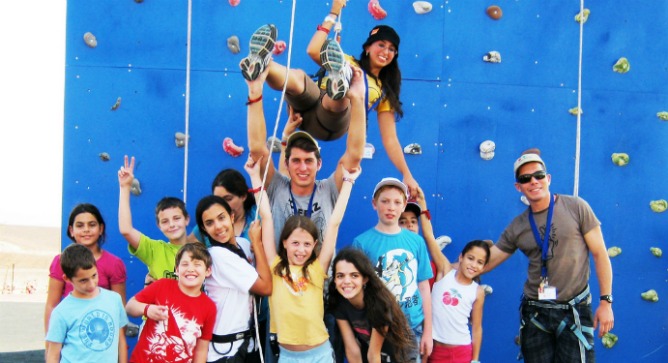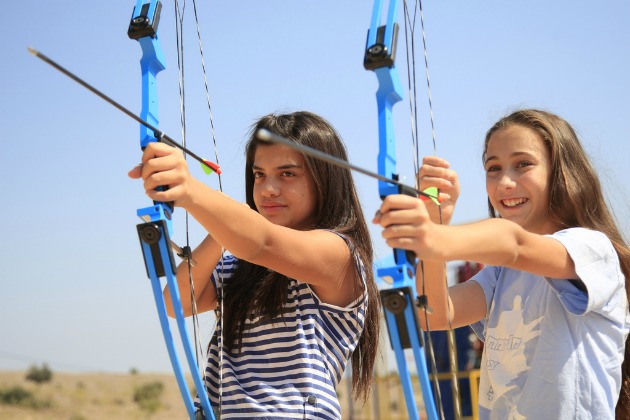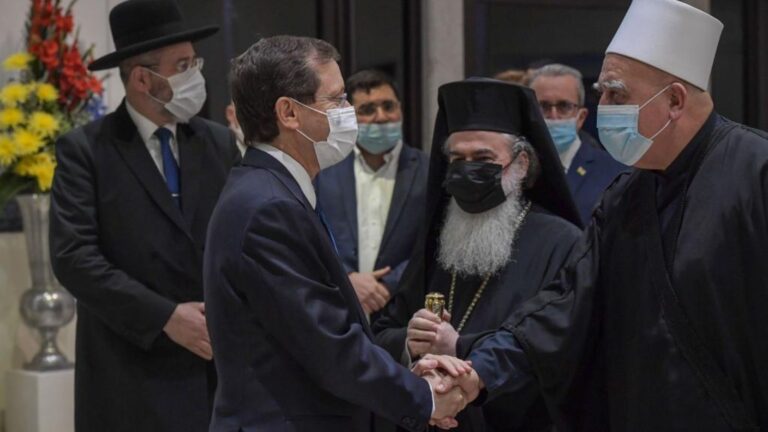“For us and for our son, you created a magic that really cannot be described in words,” wrote the parents of a camper at Jordan River Village in Israel, the newest member of the global network of free sleep-away camps for seriously ill children started by the actor Paul Newman 24 years ago.
“Our son came back thrilled, excited, optimistic and happy … and the first thing he asked is whether he can come back again next year.”
Spread the Word
• Email this article to friends or colleagues
• Share this article on Facebook or Twitter
• Write about and link to this article on your blog
• Local relevancy? Send this article to your local press
The only program of its kind in the Middle East, Jordan River Village (JRV) offers 24-hour medical supervision during a week of swimming and drama, sports and arts in a 61-acre setting in the Upper Galilee. One counselor tends every two or three campers — kids between the ages of nine and 18 with cancer, cerebral palsy, cystic fibrosis, hemophilia, familial dysautonomia, neurological disorders, rheumatic diseases, heart diseases and other life-threatening or chronic conditions.
In most ways, JRV is like all SeriousFun camps in the United States, Europe and Asia. However, by virtue of its location it also presents a rare opportunity for Jewish, Muslim and Christian children to become friends.
“Before we had our site in Israel, we sent eight groups of children to a [SeriousFun] camp in the States,” CEO Katia Citrin tells ISRAEL21c. “Each group typically had four Jews and four Arabs. The father of one Arab girl was extremely worried about how she’d cope. She wasn’t fluent in Hebrew, let alone English. When she got back, he told us she had a fantastic experience. He said that if we would leave the problems of the Middle East to the children, we would have had peace long ago.”
Year-round camp
While many SeriousFun camps run only in the summer, the temperate climate in northern Israel allows JRV to offer sessions year-round. There have been 20 since last August when the camp unofficially opened, says Citrin. The gala opening took place on June 10.
Citrin estimates that JRV will serve approximately 3,500 children every year. Unfortunately, it’s not hard to find potential campers. “We work with all kinds of NGOs that deal with sick children, and with hospitals,” says Citrin, “and people also can approach us privately to enroll for a session.”
Originally called the Hole in the Wall Gang Camp when Newman started this charitable program in 1988 in Connecticut, SeriousFun has branched out across the world. The JRV Foundation was founded in 1999 by Marilyn and Murray Grant, Connecticut émigrés to Israel who wanted “to enrich the lives of Jewish and Arab children, in Israel and in the neighboring countries, suffering from serious illnesses and life-threatening conditions by creating free, fun-filled, memorable, empowering, medically sound and safe camping experiences.”
The camp is recognized and supported in part by the Israeli government, and Israeli actor Chaim Topol chairs the board that oversees hundreds of volunteers along with 15 paid staffers.
Because Israel is a small country and many of the campers have frequently been hospitalized, they often see familiar faces when they arrive. Ice-breaking activities help everyone get to know one another, and Citrin relates that differences of religion, nationality and culture melt away rapidly.
“An Arab child came as a camper when he was 17 and he had such a great time and liked the idea of coexistence so much, that when he turned 18 he became a volunteer in the village,” she says.
Smiles on her face
Many of the campers have never slept under the stars or interacted with other children like themselves in a non-medical setting. They gain perspective on their problems by seeing what other children are coping with, but they are taught not to let their physical infirmity define them.
“Our motto is, ‘I am not sick; I have a disease.’ And our new public relations campaign theme is about celebrating life,” says Citrin.
Nobody is forced to participate in any activity, yet “there’s no possibility of failure in our camp. Whatever you do, you succeed at. We have an adventure park with climbing walls, ropes and other challenges. Children support other children and encourage them to do these activities. If a sick child can climb a six-meter wall, she feels she can do anything.”
She recalls one child with chronic colitis who had missed school for many months and arrived at JRV very introverted and shy. “At the end of the session, his mother called and said she sent us a ‘wimp’ and received back a man,” reports Citrin.
Just as importantly, SeriousFun campers worldwide have been observed to react more favorably to medical treatment and to be in a more positive frame of mind. That is significant, because psychological factors can strongly affect recovery from serious illness. And a happier child does wonders for the entire family’s emotional well-being.
As the parents of one camper wrote to Citrin, “we felt relieved and happy to see smiles on her face.”
“For us and for our son, you created a magic that really cannot be described in words,” wrote the parents of a camper at Jordan River Village in Israel, the newest member of the global network of free sleep-away camps for seriously ill children started by the actor Paul Newman 24 years ago.
“Our son came back thrilled, excited, optimistic and happy … and the first thing he asked is whether he can come back again next year.”
The only program of its kind in the Middle East, Jordan River Village (JRV) offers 24-hour medical supervision during a week of swimming and drama, sports and arts in a 61-acre setting in the Upper Galilee. One counselor tends every two or three campers — kids between the ages of nine and 18 with cancer, cerebral palsy, cystic fibrosis, hemophilia, familial dysautonomia, neurological disorders, rheumatic diseases, heart diseases and other life-threatening or chronic conditions.
In most ways, JRV is like all SeriousFun camps in the United States, Europe and Asia. However, by virtue of its location it also presents a rare opportunity for Jewish, Muslim and Christian children to become friends.
“Before we had our site in Israel, we sent eight groups of children to a [SeriousFun] camp in the States,” CEO Katia Citrin tells ISRAEL21c. “Each group typically had four Jews and four Arabs. The father of one Arab girl was extremely worried about how she’d cope. She wasn’t fluent in Hebrew, let alone English. When she got back, he told us she had a fantastic experience. He said that if we would leave the problems of the Middle East to the children, we would have had peace long ago.”
Year-round camp
While many SeriousFun camps run only in the summer, the temperate climate in northern Israel allows JRV to offer sessions year-round. There have been 20 since last August when the camp unofficially opened, says Citrin. The gala opening took place on June 10 with Israeli President Shimon Peres as guest of honor.
Citrin estimates that JRV will serve approximately 3,500 children every year. Unfortunately, it’s not hard to find potential campers. “We work with all kinds of NGOs that deal with sick children, and with hospitals,” says Citrin, “and people also can approach us privately to enroll for a session.”
Originally called the Hole in the Wall Gang Camp when Newman started this charitable program in 1988 in Connecticut, SeriousFun has branched out across the world. The JRV Foundation was founded in 1999 by Marilyn and Murray Grant, Connecticut émigrés to Israel who wanted “to enrich the lives of Jewish and Arab children, in Israel and in the neighboring countries, suffering from serious illnesses and life-threatening conditions by creating free, fun-filled, memorable, empowering, medically sound and safe camping experiences.”
The camp is recognized and supported in part by the Israeli government, and Israeli actor Chaim Topol chairs the board that oversees hundreds of volunteers along with 15 paid staffers.
Because Israel is a small country and many of the campers have frequently been hospitalized, they often see familiar faces when they arrive. Ice-breaking activities help everyone get to know one another, and Citrin relates that differences of religion, nationality and culture melt away rapidly.
“An Arab child came as a camper when he was 17 and he had such a great time and liked the idea of coexistence so much, that when he turned 18 he became a volunteer in the village,” she says.
Smiles on her face
Many of the campers have never slept under the stars or interacted with other children like themselves in a non-medical setting. They gain perspective on their problems by seeing what other children are coping with, but they are taught not to let their physical infirmity define them.
“Our motto is, ‘I am not sick; I have a disease.’ And our new public relations campaign theme is about celebrating life,” says Citrin.
Nobody is forced to participate in any activity, yet “there’s no possibility of failure in our camp. Whatever you do, you succeed at. We have an adventure park with climbing walls, ropes and other challenges. Children support other children and encourage them to do these activities. If a sick child can climb a six-meter wall, she feels she can do anything.”
She recalls one child with chronic colitis who had missed school for many months and arrived at JRV very introverted and shy. “At the end of the session, his mother called and said she sent us a ‘wimp’ and received back a man,” reports Citrin.
Just as importantly, SeriousFun campers worldwide have been observed to react more favorably to medical treatment and to be in a more positive frame of mind. That is significant, because psychological factors can strongly affect recovery from serious illness. And a happier child does wonders for the entire family’s emotional well-being.
As the parents of one camper wrote to Citrin, “we felt relieved and happy to see smiles on her face.”

















